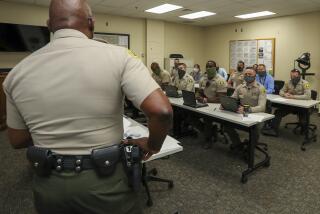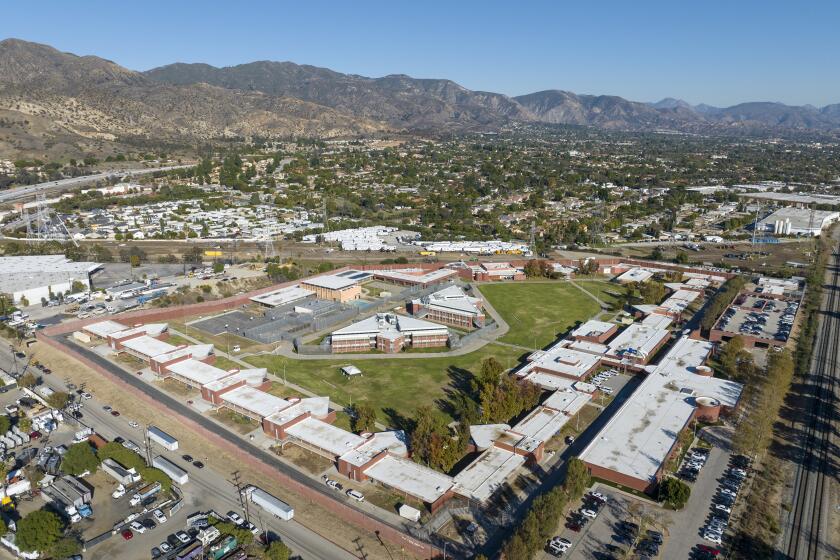Apple vs. FBI: iPhone encryption battle likely to continue even after San Bernardino
The U.S. said it might have a way to unlock the phone of one of the assailants in December’s terror attack in San Bernardino without the tech giant’s help.
- Share via
The U.S. government’s announcement that it might be able to unlock a San Bernardino shooter’s iPhone without Apple’s help is not likely to end the debate over encryption, privacy and national security.
Law enforcement has complained for many months that data encryption creates a major investigative hurdle in the hunt for killers, human traffickers, child pornographers and other offenders.
The latest fight over the issue arose after the Dec. 2 attack at the Inland Regional Center in San Bernardino that left 14 dead and 22 wounded. Justice officials have concluded that the assault by Syed Rizwan Farook and his wife was an act of terrorism.
See the most-read stories this hour >>
After the couple were killed in a shootout with police, investigators found an iPhone 5c that Farook was issued for his job as a county health inspector. Although FBI agents have managed to learn much about Farook and his wife, they wanted to access the phone in hopes it would help answer outstanding questions, such as whether the killers had accomplices.
Q: What do we know about why the FBI halted a planned court hearing designed to compel Apple to help unlock the phone?
An outside party came forward Sunday and showed investigators a way to circumvent the iPhone security features that had previously flummoxed the FBI’s computer experts, federal authorities said Monday.
With the eleventh-hour announcement, prosecutors sought, and quickly received, an indefinite postponement of a court hearing that had been scheduled in Riverside on Tuesday. Prosecutors had planned to use the hearing to make their case for why a judge should force Apple to cooperate in hacking into the phone.
In a court filing, and on a conference call with reporters, Department of Justice officials did not provide details about who had approached them or the technique that was suggested for breaking into the phone. They said, however, they were “cautiously optimistic” the idea would succeed.
“If the method is viable,” prosecutors wrote, “it should eliminate the need for the assistance from Apple.”
Q: What does the possible breakthrough mean in the larger effort by U.S. officials to tap into the electronic devices of suspected terrorists?
Even if the FBI is able to crack the iPhone belonging to the San Bernardino assailant without Apple’s help, the larger issue isn’t going to go away.
Brian Levin, a Cal State San Bernardino professor and terrorism expert, said terror groups are even developing their own encryption and operating systems to no longer rely on corporate systems.
“This is a situation where technology can outrun any legal decision,” Levin said. “While the FBI might be able to crack this iPhone, what is going to happen to the latest iPhone and other advancing technology?”
Levin said counter-terrorism agencies face constant and new encryption efforts by Apple and other commercial technology providers. But intelligence shows that terrorists are doing their own work in this area, he said.
“Terrorism groups, including ISIS and Al Qaeda, are doing an end-run around commercial systems and they are developing their own encrypted systems. They are getting their own programmers,” Levin said.
Q: What does the delay in the court hearing mean for Apple?
Apple has at least a temporary reprieve in what had become a risky and possibly damaging legal face-off with the U.S. government. But the announcement that the FBI might have another way into the phone presented the world’s most valuable company with another troubling scenario: that some unknown group has devised a way to break into iPhones despite the company’s efforts to protect customers’ privacy with new encryption and security buffers.
FULL COVERAGE: Apple’s fight with the FBI >>
In a call with reporters, Apple attorneys underscored the bind the company finds itself in. If the government does drop its demand for help, the firm will probably remain in the dark on what prosecutors learned and who taught it to them.
The attorneys, who spoke on the condition that they not be identified, said Apple would ask the government to share what vulnerability it had recently discovered as a result of Sunday’s new information. They stressed that they remained uncertain whether there is in fact a way to bypass the security measures.
MORE ON APPLE VS. FBI
Tim Cook jumps right into discussing Apple-FBI iPhone encryption fight
FBI says it might be able to unlock San Bernardino terrorist’s iPhone without Apple’s help
In FBI encryption fight, Apple seeks Latino support
More to Read
Sign up for Essential California
The most important California stories and recommendations in your inbox every morning.
You may occasionally receive promotional content from the Los Angeles Times.
















